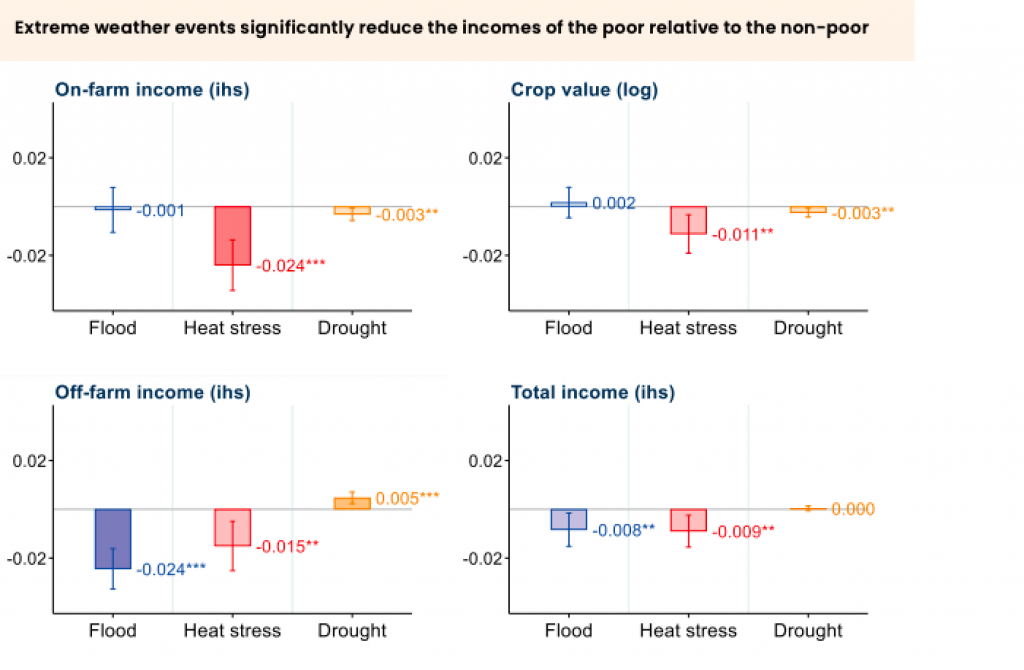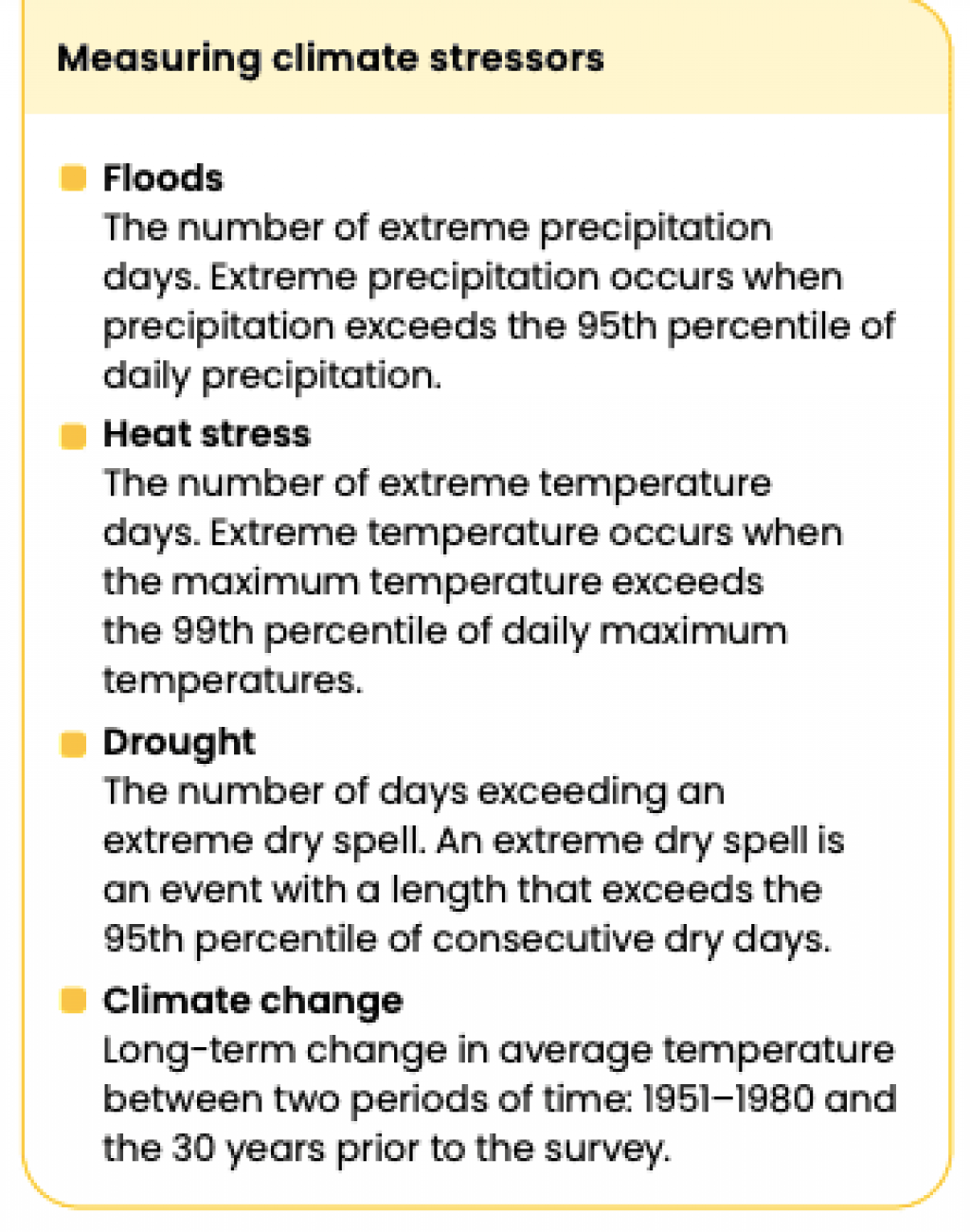Biodiversity & Environment
The Unjust Climate: FAO
- 07 Mar 2024
- 8 min read
For Prelims: The Unjust Climate: FAO, Food and Agriculture Organization, Climate Change, Extreme Precipitation, Heat Stress.
For Mains: The Unjust Climate: FAO, Impact of Climate Change on Agriculture and Food Security.
Why in News?
Recently, the Food and Agriculture Organization of the United Nations (FAO), has released a report titled- The Unjust Climate, shows how the effects of Climate Change on income and adaptation in rural areas vary with gender, wealth and age.
- FAO analyzed socioeconomic data from over 100,000 rural households representing more than 950 million people across 24 LMICs (Lower Middle Income Countries).
- The study integrated this information with 70 years of georeferenced daily precipitation and temperature data to examine the impacts of climate stressors on incomes, labour, and adaptation strategies, differentiating based on wealth, gender, and age.
What are the Key Findings of the Report?
- Impact of Extreme Weather on Poor Rural Households:
- Every day of extreme heat results in poor rural households losing 2.4% of on-farm incomes, 1.1% of crop value, and 1.5% of off-farm income compared to non-poor households across India and 23 other LMICs (Lower Middle Income Countries).
- A 1°C increase in long-term temperatures would push rural poor households to rely more on climate-dependent agriculture, leading to a 33% decrease in off-farm incomes.
- Similarly, every day of extreme Precipitation causes poor households to lose 0.8% of their incomes relative to non-poor households, mainly driven by losses in off-farm incomes.
- Income Inequality Widening Due to Climate Stressors:
- In an average year, poor households lose 5% of their total income due to Heat Stress and 4.4% due to floods compared to better-off households.
- Floods and heat stress widen the income gap between poor and non-poor households in rural areas by approximately USD 21 billion and USD 20 billion a year, respectively.
- Maladaptive Coping Strategies:
- Extreme weather events push poor rural households to adopt maladaptive coping strategies, including distress sale of livestock and redirecting expenditures away from their farms.
- Poor households reduce their investments in agriculture relative to non-poor households when faced with floods and droughts, as they redirect their scarce resources away from agricultural production towards immediate consumption needs.
- These maladaptive coping strategies are likely to make them more vulnerable to future climate stressors than non-poor rural households.
- Inadequate Inclusion in National Climate Policies:
- Rural people and their climate vulnerabilities are largely absent in national climate policies.
- Less than 1% of Nationally Determined Contributions (NDC) and national adaptation plans (NAP) of the 24 analysed countries mention poor people, and only about 6% refer to farmers in rural communities.
- Only 7.5% of tracked climate finance in 2017-18 went towards climate change adaptation, with less than 3% allocated to agriculture, forestry, and other land uses.
- Agricultural policies also miss the opportunity to address gender equality and women's empowerment and intersecting vulnerabilities such as climate change.
- An analysis of agricultural policies from 68 low- and middle-income countries done by FAO in 2023 showed that about 80% of policies did not consider women and climate change.
What are the Recommendations of the Report?
- It is suggested that addressing these challenges requires targeted interventions to empower various rural populations to engage in climate-adaptive measures.
- It is imperative to invest in policies and programmes that address the multidimensional climate vulnerabilities of rural people and their specific constraints, including their limited access to productive resources.
- It is recommended to link social protection programmes to advisory services that can encourage adaptation and compensate farmers for losers, such as cash-based social assistance programs.
- Gender-transformative methodologies that directly challenge discriminatory gender norms, could also tackle the entrenched discrimination that often prevents women from exercising full agency over economic decisions that impact their lives.
What are the FAO’s Initiatives to Tackle the Impact of Climate Change?
- Inclusive climate actions are embedded in FAO’s Strategy and Action Plan on Climate Change and in the FAO Strategic Framework 2022–2031, where tackling the impact of climate change is mainstreamed in efforts to achieve the four betters: better production, better nutrition, better environment and better life for all.
- FAO’s Global Roadmap for Achieving SDG (Sustainable Development Goal) 2 without breaching the 1.5 °C threshold, establishes that gender inequalities, climate actions and nutrition are simultaneous considerations, and actions must encompass these dimensions and promote inclusivity for women, youth and Indigenous Peoples.
What is the Food and Agriculture Organization?
- About:
- FAO is a specialised agency of the United Nations that leads international efforts to defeat hunger.
- World Food Day is celebrated every year around the world on 16th October. The day is celebrated to mark the anniversary of the founding of the FAO in 1945.
- It is one of the UN food aid organisations based in Rome (Italy). Its sister bodies are the World Food Programme and the International Fund for Agricultural Development (IFAD).
- FAO is a specialised agency of the United Nations that leads international efforts to defeat hunger.
- Initiatives Taken:
- Globally Important Agricultural Heritage Systems (GIAHS).
- Monitors the Desert Locust situation throughout the world.
- The Codex Alimentarius Commission (CAC) is the body responsible for all matters regarding the implementation of the Joint FAO/WHO Food Standards Programme.
- The International Treaty on Plant Genetic Resources for Food and Agriculture was adopted by the Thirty-First Session of the Conference of the FAO in 2001.
- Flagship Publications:
- The State of World Fisheries and Aquaculture (SOFIA).
- The State of the World's Forests (SOFO).
- The State of Food Security and Nutrition in the World (SOFI).
- The State of Food and Agriculture (SOFA).
- The State of Agricultural Commodity Markets (SOCO).
UPSC Civil Services Examination Previous Year Question (PYQ)
Prelims:
Q. The FAO accords the status of ‘Globally Important Agricultural Heritage System (GIAHS)’ to traditional agricultural systems. What is the overall goal of this initiative? (2016)
- To provide modern technology, training in modern farming methods and financial support to local communities of identified GIAHS so as to greatly enhance their agricultural productivity.
- To identify and safeguard eco-friendly traditional farm practices and their associated landscapes, agricultural biodiversity and knowledge systems of the local communities.
- To provide Geographical Indication status to all the varieties of agricultural produce in such identified GIAHS.
Select the correct answer using the code given below:
(a) 1 and 3 only
(b) 2 only
(c) 2 and 3 only
(d) 1, 2 and 3
Ans: (b)
Mains:
Q.1 The effective management of land and water resources will drastically reduce the human miseries. Explain. (2016)






